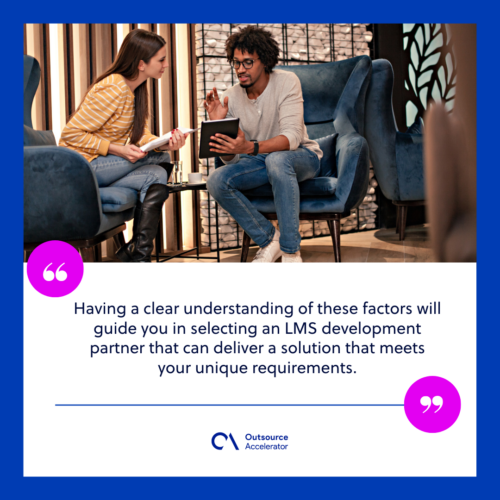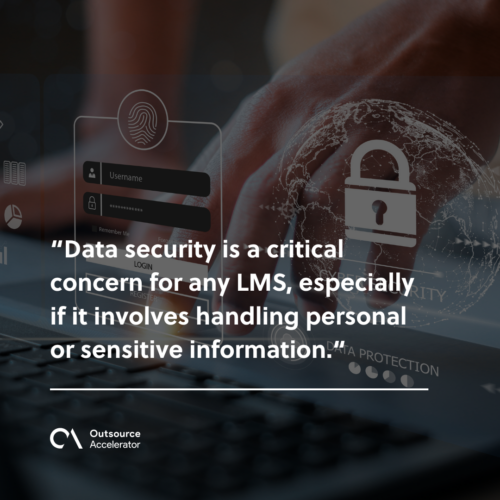How to choose the right LMS development partner for your organization

This article is a submission by Sayone Technologies Pvt Ltd. Sayone Technologies Pvt Ltd. is an IT and digital services company from India, focusing on new technologies for clients globally. They have completed 300+ projects for startups and SMEs, with a team of 100+ employees.
Learning Management Systems (LMS) are becoming indispensable in the digital age for companies looking to improve employee performance, uplift their training initiatives, and cultivate a continuous learning culture.
However, selecting the appropriate development partner is crucial to the success of an LMS project.
This article explores the 10 important factors to help you choose the right LMS development partner. This partner should be able to provide a customized solution that fits the needs and goals of your company.
10 steps to choose the right LMS development partner for your business
1. Conduct an internal assessment of your business needs
Before embarking on the search for an LMS development partner, it’s vital to conduct an internal assessment to identify your organization’s specific learning and development needs.
Start by asking the following questions:
- What are your training goals?
- Are you looking to improve employee onboarding, compliance training, or upskill your workforce?
- Who is your target audience?
- Consider the number of users, their roles, and the type of content they will need.
- What features are essential?
- Identify whether you need features like mobile learning, gamification, social learning, or advanced analytics.
- What integrations are required?
- Consider existing tools and systems like HR software, CRM, or ERP that the LMS needs to integrate with.
Having a clear understanding of these factors will guide you in selecting an LMS development partner that can deliver a solution that meets your unique requirements.

2. Evaluate technical expertise
The technical expertise of your LMS development partner is paramount. They should have a robust understanding of modern LMS technologies and be proficient in the platforms and programming languages relevant to your project.
Here’s what to look for:
- Technology stack. Ensure they have experience with popular LMS platforms such as Moodle, Totara, or custom frameworks like Django or Node.js.
- Integration capabilities: They should be skilled in integrating the LMS with other enterprise systems, such as HR, CRM, or content management systems.
- Scalability and security: The partner should be capable of building an LMS that is both scalable to accommodate future growth and secure to protect sensitive data.
Ask for detailed information about the tools and technologies they use, as well as their approach to managing data security. These are essential especially if your organization deals with sensitive or regulated information.
3. Assess industry experience and knowledge
Experience matters when it comes to LMS development, especially within your specific industry.
A partner with experience in your sector will have a better understanding of industry-specific challenges and compliance requirements, which can significantly reduce project risks.
Industry-specific solutions
Look for a partner who has developed LMS solutions for other organizations in your industry. This ensures they are familiar with your unique needs and can anticipate potential challenges.
Compliance and standards
Ensure they understand relevant industry standards and regulations (e.g., SCORM, xAPI, GDPR, HIPAA) and can incorporate these into the LMS.
Case Studies and references
Request case studies or client references to validate their experience and the outcomes of their previous projects.
4. Look for customization and flexibility
A one-size-fits-all LMS rarely meets the diverse needs of an organization. Your LMS development partner should offer a high degree of customization and flexibility to tailor the system according to your specifications.
The partner should be able to customize the user interface, workflows, reporting tools, and integrations to match your needs.
In addition, the LMS should be designed with a modular approach, allowing for the addition of new features or functionalities as your needs evolve.
Ensure the LMS is accessible on various devices, including desktops, tablets, and smartphones, to cater to a mobile workforce.
5. Ensure efficient communication and project management
Effective communication and a solid project management framework are crucial for the success of an LMS development project.
This ensures that the project stays on track, within budget, and meets your expectations.
- Communication channels: Establish clear lines of communication with regular updates and feedback loops.
- Project management methodology: Understand whether the partner uses Agile, Waterfall, or a hybrid approach and how it aligns with your organization’s workflow.
- Milestones and deliverables: Set up clear milestones and deliverables to guarantee that the project progresses as planned.
6. Check ongoing support and maintenance plans
The journey doesn’t end with the deployment of your LMS. Ongoing support and maintenance are essential to ensure the system continues to meet your needs over time.
- Post-launch support: Determine the level of support offered post-launch, including bug fixes, updates, and user training.
- Maintenance plans: Look for partners who offer comprehensive maintenance plans that include regular updates, performance monitoring, and security audits.
- Service Level Agreements (SLAs): Ensure there are clear SLAs that outline the response time for support queries, uptime guarantees, and resolution timelines.
7. Evaluate costs
While it’s important to find a cost-effective solution, it’s equally important to balance cost with quality.
Here’s how to evaluate the financial aspects of choosing an LMS development partner:
Transparent pricing
Ensure the partner provides a clear and detailed pricing structure, including any potential additional costs for customization, integrations, or ongoing support.
Value for money
Assess the long-term value of the solution. A cheaper upfront cost might lead to higher expenses in the long run due to scalability issues or lack of support.
Return on Investment (ROI)
Consider the potential ROI of the LMS. A well-designed system can lead to significant cost savings by improving efficiency and reducing training time.
8. Prioritize data security and compliance
Data security is a critical concern for any LMS, especially if it involves handling personal or sensitive information.
Your LMS development partner must prioritize data protection and compliance. Here are some steps to do this:
- Inquire about the security protocols the partner employs, including data encryption, secure access controls, and regular security audits.
- Ensure the LMS complies with relevant regulations, such as GDPR, HIPAA, or industry-specific standards, to avoid legal complications.
- Check if the partner offers robust data backup and disaster recovery plans to protect your data in case of an unexpected event.

9. Check client feedback
The reputation of your potential LMS development partner is a good indicator of their reliability and quality of work. Look for feedback from past clients to gain insights into their experience.
Seek out client testimonials and online reviews to get an understanding of the partner’s strengths and weaknesses. Research their standing in the industry by looking at awards, recognitions, or partnerships that speak to their credibility.
You may also check the partner’s retention rate. A high client retention rate is a sign of customer satisfaction and consistent performance.
10. Make the final decision
After conducting thorough research and evaluations, narrow down your list to a few top candidates. Consider the following before making your final decision:
- Trial projects: If possible, engage the partner in a small trial project to assess their capabilities and working style before committing to a full-scale engagement.
- Contract terms: Review the contract terms carefully, ensuring that all aspects of the partnership, including timelines, costs, deliverables, and support, are clearly defined.
- Long-term partnership potential: Choose a partner with whom you can build a long-term relationship, as ongoing collaboration will be crucial for future LMS enhancements and support.
Choosing the right LMS development partner is a critical decision that can significantly impact the effectiveness of your learning and development initiatives.
A well-chosen LMS development partner will help you create a powerful platform that fosters continuous learning, enhances employee performance, and drives organizational success.
By carefully considering factors such as technical expertise, industry experience, customization capabilities, and ongoing support, you can select a partner who will deliver a high-quality LMS that aligns with your organizational goals.
Investing time in this selection process will pay off in the long run, ensuring that your LMS not only meets your current needs but also evolves with your organization.







 Independent
Independent




